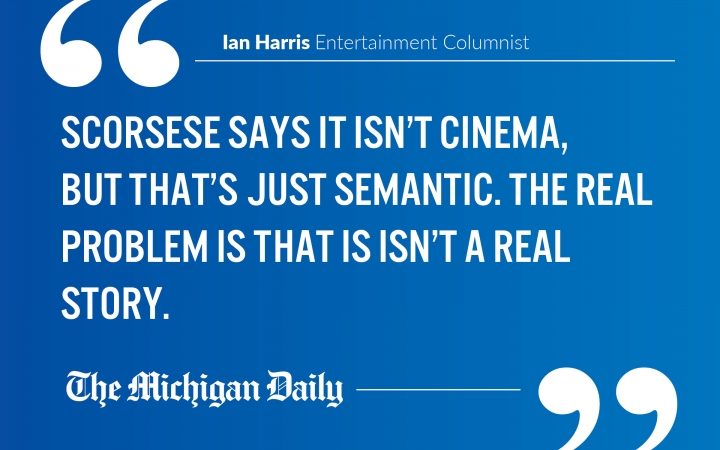
Over the past few weeks, Martin Scorsese (“The Irishman”) has made a number of comments in regards to the Marvel Cinematic Universe and how he does not believe that it constitutes cinema. This sparked a wave of controversy, with numerous MCU directors such as James Gunn (“Guardians of the Galaxy”) and Joss Whedon (“The Avengers”) entering the fray to defend their work. Bob Iger, the CEO of the Disney Corporation, invited Scorsese to get dinner with him to discuss his feelings. Twitter was in a full on war against the man, decrying Scorsese as an out of touch auteur. Many across the Internet saw this as a quintessential moment in which to say, “OK, boomer.” However, all of this anger at Scorsese is entirely misplaced. Simply put, the man could not be more right.
Since “Iron Man” was released in 2008, there have been almost 25 films released in the MCU. In that time there have also been countless DC flicks, X-Men movies, an attempt to reboot the Fantastic Four, and two different reboots of Spider-Man. Every movie studio has tried their hand at creating their own version of the cash cow franchise of the decade and most have failed. The DC cinematic universe crashed and burned with “Justice League,” the so called “Dark Universe” never made it past the Tom Cruise helmed “The Mummy” and Universal’s “MonsterVerse” has hit rough waters after the mixed reviews and lower box office numbers for “Godzilla: King of the Monsters.” If anyone out there in the world today believes that any of the people behind these “cinematic universes” had their eyes on anything other than money, they are sorely mistaken.
What constitutes “cinema” can be debated all day long. Yes, the MCU films are moving pictures with audio attached to them that play in movie theaters and are usually seen while eating popcorn. They are ostensibly pieces of cinema in the sense that they exist within what we have come to define as cinema for a century. But as Scorsese points out, these films lack certain characteristics that most good movies have. They do not attempt to say anything compelling about society or the world at large. And despite what their legions of proponents will tell you, they do nothing to advance film as an artform. They are glorified amusement park rides, and nothing more.
Characters in the MCU don’t have “arcs” in the way that most characters do in serialized fiction. While the characters do occasionally change, these changes often occur off-screen and are flip-of-the-switch moments in which a character is completely different than they were before. For most of the series, Bruce Banner/The Hulk’s main storyline is his inability to balance the two halves of his life. Between the two most recent “Avengers” films, that problem is solved off-screen. That is not an arc. Many will point to Iron Man’s sacrifice at the end of “Endgame” as an example of how far the character has grown, but they conveniently leave out the fact that he was ready to make the same sacrifice at the end of the original “Avengers” film that was released seven years ago. If he has grown, he has grown to end up in the exact same place.
Certainly, there was a time when people decried other works of popular fiction as being devoid of deeper meaning and existing only to serve the whims of the masses. “Star Wars,” “Harry Potter” and “Lord of the Rings” all faced these criticisms in their own time. And yet all three of those franchises exhibit those crucial items that the Marvel movies as of yet have lacked. Those stories are all about something. “Star Wars” is about family, “Harry Potter” is about love and “Lord of the Rings” is about the power of the human will. Are these simple and universal themes? Yes. But nonetheless those stories have beginnings, middles and ends. Characters grow and change and are fundamentally different people at the beginning than they are at the end. Each of these series was not (at first) created simply to fill a tub full of money, but to tell a story that the author wished to tell. Who is the author of the MCU? Is it Kevin Feige, the producer? Is it the Russo brothers? Is it the Disney company? No one knows for sure because the series has no true author. It’s an amalgamation of ideas designed mainly to make as much money as possible. Scorsese says it isn’t cinema, but that’s just semantics. The actual problem is that it isn’t a real story.

